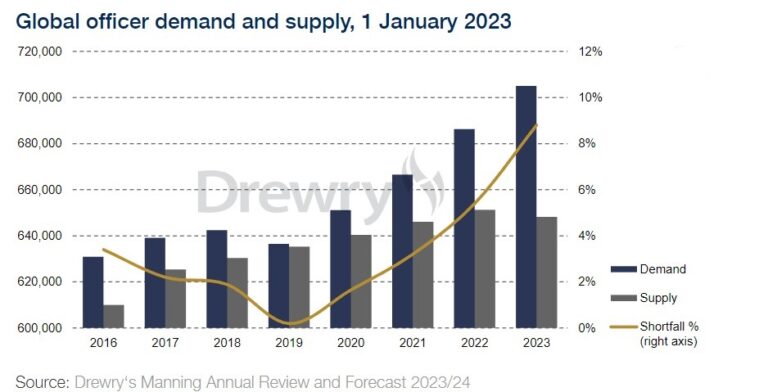You are here
Seafarer labour market tightness at highest levels recorded
Seafarer labour market tightness at highest levels recorded
Adis Ajdin June 8, 2023 https://splash247.com/seafarer-labour-market-tightness-at-highest-levels...
Officer supply shortage has hit an all-time high and is unlikely to improve, resulting in manning cost inflation, according to the latest published by shipping consultants Drewry.
Drewry said the 2023 officer availability gap has widened to a deficit equating to about 9% of the global pool, up from last year’s 5% shortfall and the highest level since it first started analysing the seafarer market 17 years ago.
The consultancy forecasts similar deficit levels for 2023 to 2028 based on the limits of new seafarer supply becoming available. “While these deficit levels are based on vessel numbers together with assumptions on crewing levels and so largely theoretical, they clearly indicate that the seafarer labour market has become particularly tight, with important implications for recruitment and retention as well as manning costs,” Drewry noted.
Aside from the covid epidemic, which has had a significant impact on crew training as well as the overall allure of working at sea, the Russia-Ukraine war has caused further issues with seafarer supplies. Drewry, on the other hand, warned that the accelerating increase in the global deepsea vessel fleet would exacerbate the situation.
“Employers are seeking alternative sources of supply to fill the gap, and wages have also begun to show more volatility,” said Drewry’s head of manning research Rhett Harris. “While sectors like containerships and offshore supply vessels have already seen increasing wage rates due to the strength of the sectors, we expect wage cost to accelerate for other vessel types as well.”
The report, which covers seafarer cost assessments, trends, and employment terms for 38 ship types in the chemical, container, dry bulk, general cargo, LPG, LNG, offshore, oil tankers, reefers, and RoRo sectors, highlighted the importance of wellbeing in employee retention, with the trend of looking beyond wage rates becoming stronger by the day.
“Things like good communication channels with families at home, comfortable facilities onboard and a supportive work environment are gaining importance.”
The stretched nature of the maritime workforce is a regular topic at events organised by Splash. At the most recent Maritime CEO Forum in Singapore, for instance, Mark O’Neil, president of Columbia Shipmanagement, said shipping needed to adopt “proper” human resource management.
“We talk about crew and personnel departments but this is antiquated,” the shipmanager said, urging the industry to better identify with crew, something that had improved with covid.
Better communication, and detailed, encouraging career planning were identified by O’Neill as vital. For crew, pay and packages need a relook, O’Neil said, pointing out how many seafarers do not have pension schemes or healthcare coverage in place.


